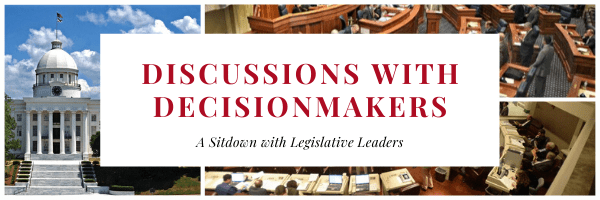Category: Advocacy
-

2022 Advocacy Agenda
As the professional association for some 7,000 physicians of all specialties in Alabama, the Medical Association of the State of Alabama exists to serve, lead, and unite physicians in promoting the highest quality of healthcare for the people of Alabama through advocacy, information, and education. The Medical Association of Alabama is proud to advocate on…
-

Discussions with Decisionmakers: Sen. Sam Givhan
What first prompted you to consider running for office? Now going through one term I see that the freshmen class is making a difference. We have a special bond and it makes the work more enjoyable. I try to focus on legislation that avoids us from having unintended consequences. How does your background help serve…
-
April Weaver Wins the Special General Election for Senate District 14
Congratulations Sen. April Weaver! Sen. April Weaver with Dr. John Meigs Republican Candidate, April Weaver, won the special general election against Democratic candidate, Virginia Applebaum, for Senate District 14 seat on Tuesday, July 13, 2021. The seat was previously held by Cam Ward (R) and covers Bibb, Chilton and Shelby counties. According the certified election…
-
Discussions with Decisionmakers: Sen. Jack Williams
Background Senator Williams was born in Mobile County and is a passionate farmer. Senator Williams was elected to the Alabama Senate in 2018 after serving one term in the Alabama House of Representatives. He is a member of the Senate Healthcare Committee. Senator Williams represents Alabama’s 34th District covering Mobile County. Please tell us a…
-
Not a “Rock Throwing” Committee; Pandemic Response Task Force Holds First Meeting
On Thursday, July 1, the first meeting of a legislatively-created task force to examine the state’s response to the COVID-19 pandemic was held in Montgomery. During the 2021 Legislative Session, amidst a flurry of bills being introduced related to the pandemic (like Sen. McClendon’s bill to abolish the position of State Health Officer and abolish the State Committee of Public…
-
SD14 Special General Election
SD14 Special General Election is Tuesday, July 13, 2021. The seat was previously held by Cam Ward (R) and covers Bibb, Chilton and Shelby counties. As the political action committee representing physicians across the state, Alabama Medical PAC (ALAPAC) is proud to support April Weaver in this special election. At a time when healthcare policy…
-
Discussions with Decisionmakers: Senator Tom Butler
Background Senator Butler has been a member of both the Senate and House of Representatives and has served in the Legislature for over 30 years. He is on the Senate Healthcare Committee. Senator Butler is also a registered and certified pharmacist and recently passed a bill that allows pharmacies to find more affordable alternative drugs…
-
Medical Association’s Top 10 Highlights for the 2021 Legislative Session
While the Medical Association advocated on and monitored hundreds of bills and resolutions during the 2021 Legislative Session, below is a “Top 10” list of some of the major issues on which the Association was involved.
-

Medical Association Supports Continued Funding for Maternal Death Investigations
‘Shocking’ Nearly 70% of Deaths Are Preventable, Experts Say MONTGOMERY – The Medical Association of the State of Alabama today joined Alabama legislators in calling for continued state funding to investigate why Alabama mothers die from childbirth and pregnancy complications at more than double the rate of women nationally. The funding for this research,…
-

American Rescue Plan Offers $940 Million for Medicaid Expansion and Other Benefits for Healthcare
The American Rescue Plan Act of 2021, signed by President Biden on Thursday, includes a number of key provisions that strengthen both public and private health insurance coverage. Among its Medicaid and the Children’s Health Insurance Program (CHIP) provisions, the American Rescue Plan encourages states to finally take up the Medicaid expansion by offering even…